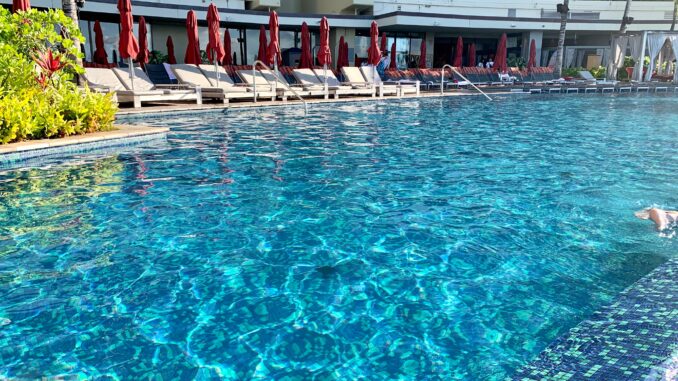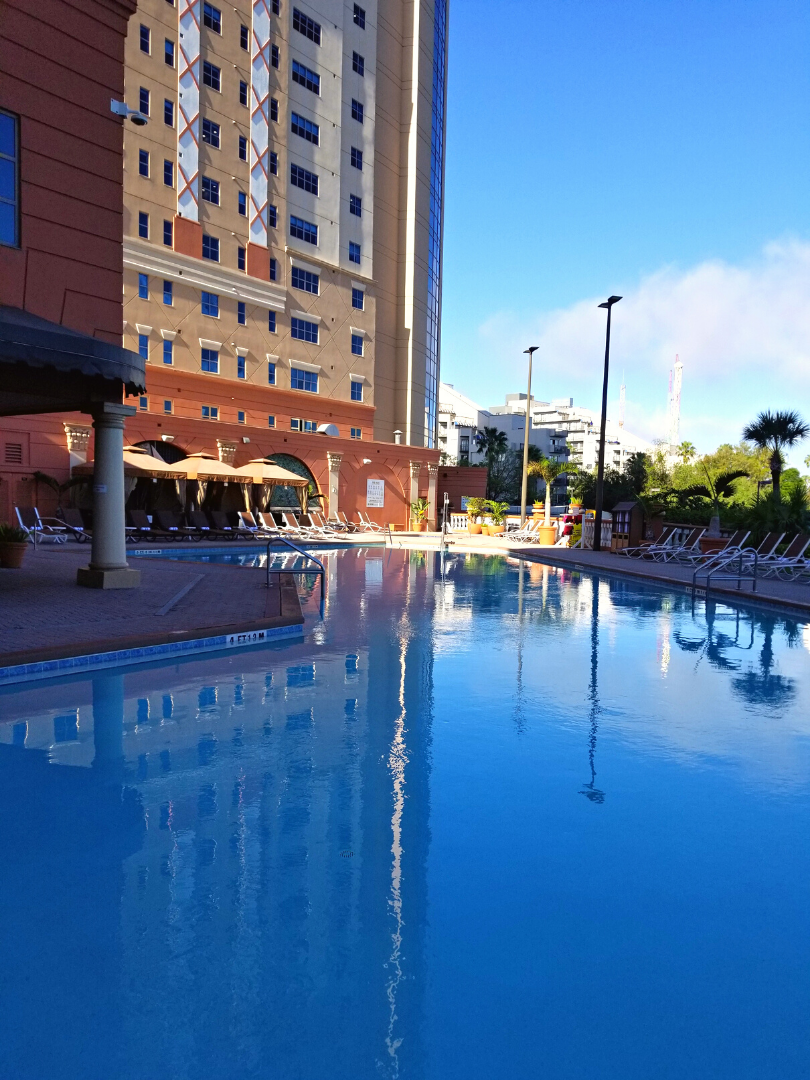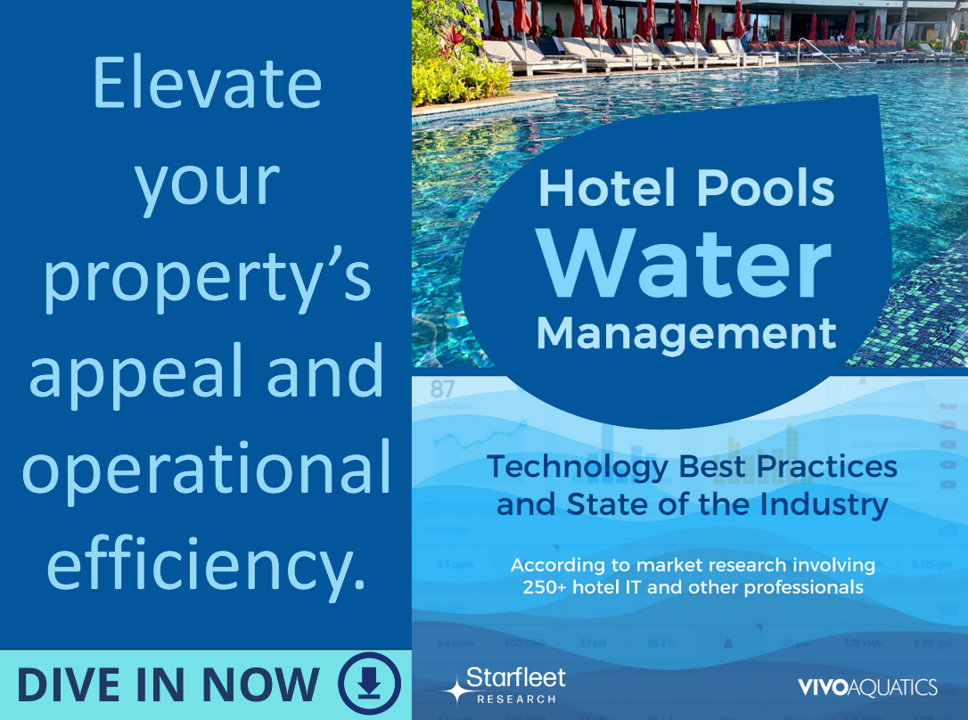
By Starfleet Research - 4.29.2024
The fact that hotels need to strive for excellence in their swimming pool water management practices — above and beyond simply complying with all regulatory standards — cannot be overstated. It is a non-negotiable aspect of hotel operations. The seriousness of the matter is highlighted by alarming statistics from the Center for Disease Control and Prevention (CDC). The CDC reports that one in three swimming-related illnesses in the U.S. is linked to hotel pools, primarily due to Cryptosporidium, Pseudomonas, and Legionella. Cryptosporidium, a resilient parasite, can survive in even well-maintained pools, while Pseudomonas and Legionella bacteria thrive in slimy environments — often including popular waterparks — showing resistance to common disinfectants.
 Hotel swimming pools, continuously exposed to large crowds of people, risk becoming illness transmission hotspots if not properly maintained. Older swimmers and smokers are particularly susceptible to Legionella, which can lead to pneumonia-like symptoms. The financial impact of guest illnesses or injuries should not be taken lightly. These can include medical costs, compensatory damages, and, in the worst cases, damages for wrongful death. Even minor pool-related health incidents related to poor water management will invariably lead to reputational damage, including negative guest comments on popular review sites like TripAdvisor, Yelp, Google Reviews, Booking.com, Expedia, etc., ultimately resulting in decreased hotel occupancy, revenue and profitability.
Hotel swimming pools, continuously exposed to large crowds of people, risk becoming illness transmission hotspots if not properly maintained. Older swimmers and smokers are particularly susceptible to Legionella, which can lead to pneumonia-like symptoms. The financial impact of guest illnesses or injuries should not be taken lightly. These can include medical costs, compensatory damages, and, in the worst cases, damages for wrongful death. Even minor pool-related health incidents related to poor water management will invariably lead to reputational damage, including negative guest comments on popular review sites like TripAdvisor, Yelp, Google Reviews, Booking.com, Expedia, etc., ultimately resulting in decreased hotel occupancy, revenue and profitability.
Traditional approaches to swimming pool water management generally fail to mitigate these risks. While pool maintenance is typically conducted by hotel staff with a sufficiently good understanding of water chemistry, filtration systems, and compliance protocols, the never-ending task of ensuring water safety tends to be time-consuming, intermittent, and error-prone when done manually using age-old tools and practices and without the benefit of today’s technology capabilities.
There is also the matter of data collection. Accurate, consistent, and complete swimming pool water record-keeping is vital for the purpose of hotel management oversight and data tracking. It allows hotels to monitor water quality effectively and identify issues promptly. Importantly, in the event of a pool-related lawsuit, detailed documentation will likely be needed to defend against allegations of wrongdoing. Traditional record-keeping methods, often involving manual logs and irregular monitoring, are often lacking. That means hotels are compromising guest safety while potentially exposing themselves to a host of negative consequences, including, in some cases, costly litigation and loss of revenue.

Fortunately, technology implementation can virtually eliminate these negatives. Automated filtration and chemical treatment solutions ensure consistent water quality, reducing the risk of waterborne infections and enhancing guest safety. Real-time water chemistry readings allow the aquatics maintenance staff to monitor a pool’s safety score, water, and chemical usage closely. Add to the mix network-connected chemical controllers, using ORP, PPM, or chlorine probes, to automatically ensure precise measurements, keeping the pool open and healthy without the need for human oversight.
A next-generation water management system with advanced platform capabilities allows for real-time monitoring of pH, chlorine levels, temperature, and flow. It provides data access from any mobile device, offering a comprehensive view of water maintenance status and current conditions across any number of hotel pools and properties. It proactively notifies the maintenance staff of irregularities, including possible leaks, ensuring chemical balance, water conservation and preventive maintenance for compliance. A state-of-the-art system also offers flexibility. Software settings can be customized, modules can be added, and IoT devices can be integrated to meet specific hotel needs. A good example is a leak sensor. Water usage and conservation is a critical concern for hotel pools in some geographic areas — e.g., where drought is prevalent — and not in others.
In addition to offering all necessary software and hardware components, some solution providers deliver educational coursework and certification, offering remote support. Staff training ensures that a maintenance team is using the technology to achieve optimal performance, automating day-to-day tasks, improving resource utilization, and optimizing processes across the board.
 The best of today’s water management systems provide a transparent view of a team’s performance, uncovering issues and inefficiencies, and emphasizing accountability in operations. This allows hospitality groups and individual hotels alike to easily organize, track, and streamline all water management processes, ensuring adherence to health advisories and the Model Aquatic Health Code (MAHC) recommendations from the Center for Disease Control (CDC). To that point, a next-generation system manages all aspects of compliance and safety. It tracks compliance status and coordinates preventative maintenance, allowing fully-automated maintenance to prevent costly repairs.
The best of today’s water management systems provide a transparent view of a team’s performance, uncovering issues and inefficiencies, and emphasizing accountability in operations. This allows hospitality groups and individual hotels alike to easily organize, track, and streamline all water management processes, ensuring adherence to health advisories and the Model Aquatic Health Code (MAHC) recommendations from the Center for Disease Control (CDC). To that point, a next-generation system manages all aspects of compliance and safety. It tracks compliance status and coordinates preventative maintenance, allowing fully-automated maintenance to prevent costly repairs.
The benefits of remote data access, seamless integration with existing systems, and ability to organize facilities across all properties on a single platform are multifold. The system collects, stores, and interprets all key data, enabling a better understanding of operations and performance. It tracks actions, and identifies improvement areas, and alerts the team to low supplies. It sets reminders for preventative maintenance, providing a clear picture of task lifecycles, accountability, and staff efficiency, offering regular facility updates. Tasks can be managed with a simple tap, eliminating manual processes. Notifications and corrective actions ensure follow-ups when needed, maintaining pool safety without 24/7 management. Individual staff are assigned flexible permissions, empowering the team as a whole and driving continuous performance improvement.
Allowing solution provider access to hotel pool water data can further increase efficiency, providing data-driven insights and recommendations for continuous performance improvement. Here it should be noted that top-tier solution providers offer top-tier customer support, including chat, email, and phone, using color-coded, icon-based software for clear communication even across language barriers. Simply put, a fully-integrated system revolutionizes hotel pool water management. It enhances efficiency, productivity, reduces costs, ensure safety and drives top-line revenue growth while paving the way for future technology innovation and even greater financial success.
Starfleet Research is a world leader in benchmarking best practices in technology-enabled business initiatives. Our research reports, focusing on how companies can maximize performance and achieve their desired objectives with respect to specific technology-enabled business initiatives, are read by thousands of industry practitioners and others around the world.
VivoAquatics provides a smart and connected technology platform for pools, spas and water features. Providing real-time chemical management, monitoring and work-flow tools, VivoAquatics helps deliver the safest and most appealing water for guests in a more sustainable and cost-effective way. VivoAquatics partners with the world’s leading hospitality, real estate and fitness brands.
